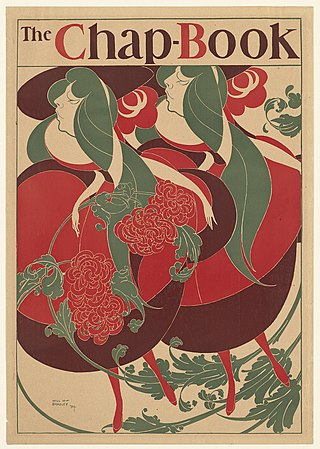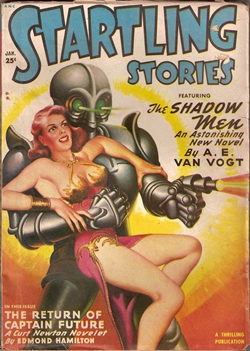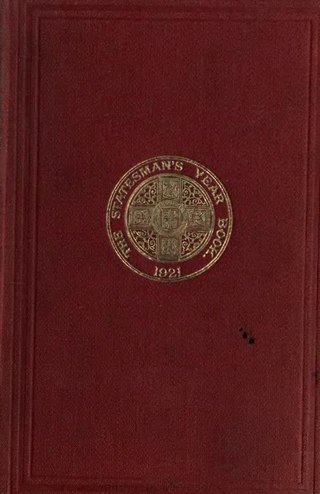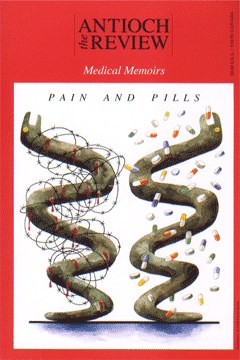
Asimov's Science Fiction is an American science fiction magazine published by Penny Press and edited by Sheila Williams. It was launched as a quarterly by Davis Publications in 1977, after obtaining Isaac Asimov's consent for the use of his name. It was originally titled Isaac Asimov's Science Fiction Magazine, and was quickly successful, reaching a circulation of over 100,000 within a year, and switching to monthly publication within a couple of years. George H. Scithers, the first editor, published many new writers who went on to be successful in the genre. Scithers favored traditional stories without sex or obscenity; along with frequent humorous stories this gave Asimov's a reputation for printing juvenile fiction, despite its success. Asimov was not part of the editorial team, but wrote editorials for the magazine.

Omni was a science and science fiction magazine published for domestic American and UK markets. It contained articles on science, parapsychology, and short works of science fiction and fantasy. It was published as a print version between October 1978 and 1995. The first Omni e-magazine was published on CompuServe in 1986 and the magazine switched to a purely online presence in 1996. It ceased publication abruptly in late 1997, following the death of co-founder Kathy Keeton; activity on the magazine's website ended the following April.

In the United States, a little magazine is a magazine genre consisting of "artistic work which for reasons of commercial expediency is not acceptable to the money-minded periodicals or presses", according to a 1942 study by Frederick J. Hoffman, a professor of English. While George Plimpton disagreed with the diminutive connotations of "little", the name "little magazine" is widely accepted for such magazines. A little magazine is not necessarily a literary magazine, because while the majority of such magazines are literary in nature, containing poetry and fiction, a significant proportion of such magazines are not. Some have encompassed the full range of the arts, and others have grown from zine roots.

Harold John Massingham (25 March 1888 – 22 August 1952) was a prolific British writer on ruralism, matters to do with the countryside and agriculture. He was also a published poet.

Startling Stories was an American pulp science fiction magazine, published from 1939 to 1955 by publisher Ned Pines' Standard Magazines. It was initially edited by Mort Weisinger, who was also the editor of Thrilling Wonder Stories, Standard's other science fiction title. Startling ran a lead novel in every issue; the first was The Black Flame by Stanley G. Weinbaum. When Standard Magazines acquired Thrilling Wonder in 1936, it also gained the rights to stories published in that magazine's predecessor, Wonder Stories, and selections from this early material were reprinted in Startling as "Hall of Fame" stories. Under Weisinger the magazine focused on younger readers and, when Weisinger was replaced by Oscar J. Friend in 1941, the magazine became even more juvenile in focus, with clichéd cover art and letters answered by a "Sergeant Saturn". Friend was replaced by Sam Merwin Jr. in 1945, and Merwin was able to improve the quality of the fiction substantially, publishing Arthur C. Clarke's Against the Fall of Night, and several other well-received stories.

Wallpaper, stylized Wallpaper*, is a publication focusing on design and architecture, fashion, travel, art, and lifestyle. The magazine was launched in London in 1996 by Canadian journalist Tyler Brûlé and Austrian journalist Alexander Geringer. It is now owned by Future plc after its acquisition of TI Media.

John Ernest Tranter was an Australian poet, publisher and editor. He published more than twenty books of poetry; devising, with Jan Garrett, the long running ABC radio program Books and Writing; and founding in 1997 the internet quarterly literary magazine Jacket which he published and edited until 2010, when he gave it to the University of Pennsylvania.

Booklist is a publication of the American Library Association that provides critical reviews of books and audiovisual materials for all ages. Booklist's primary audience consists of libraries, educators, and booksellers. The magazine is available to subscribers in print and online. It is published 22 times per year, and reviews over 7,500 titles annually. The Booklist brand also offers a blog, various newsletters, and monthly webinars. The Booklist offices are located in the American Library Association headquarters in Chicago’s Gold Coast neighborhood.

InterGalactic Medicine Show was an American online fantasy and science fiction magazine. It was founded in 2005 by multiple award-winning author Orson Scott Card and was edited by Edmund R. Schubert from 2006–2016, after which Scott Roberts took over. It was originally biannual, but became quarterly in 2008 and bimonthly in 2009, except for a brief hiatus in 2010. The magazine ceased publication in June 2019.

The Statesman's Yearbook is a one-volume reference book published annually since 1864 providing information on the countries of the world. It is published by Palgrave Macmillan.

Ronald Mathias Lockley was a Welsh ornithologist and naturalist. He wrote over fifty books on natural history, including a major study of shearwaters, and many articles. He is perhaps best known for his book The Private Life of the Rabbit.

Idbury is a village and civil parish in the Cotswold Hills in Oxfordshire, about 4+1⁄2 miles (7 km) southeast of Stow-on-the-Wold in neighbouring Gloucestershire. The parish includes the hamlets of Bould and Foscot. The 2011 Census recorded the parish's population as 240.

Valentine Ackland was an English poet, and life partner of novelist Sylvia Townsend Warner. Their relationship was strained by Ackland’s infidelities and alcoholism, but survived for nearly forty years. Both were closely involved with communism, remaining under continued scrutiny by the authorities. Ackland’s poetry did not become widely noticed until after her death, when her reflective, confessional style was more in vogue, and left-wing writers of the 1930s had become a popular topic.

The Political Quarterly is an academic journal of political science that first appeared from 1914 to 1916 and was revived by Leonard Woolf, Kingsley Martin, and William A. Robson in 1930. Its editors-in-chief are Ben Jackson and Deborah Mabbett, who assumed their posts in 2016.

Science Fiction Quarterly was an American pulp science fiction magazine that was published from 1940 to 1943 and again from 1951 to 1958. Charles Hornig served as editor for the first two issues; Robert A. W. Lowndes edited the remainder. Science Fiction Quarterly was launched by publisher Louis Silberkleit during a boom in science fiction magazines at the end of the 1930s. Silberkleit launched two other science fiction titles at about the same time: all three ceased publication before the end of World War II, falling prey to slow sales and paper shortages. In 1950 and 1951, as the market improved, Silberkleit relaunched Future Fiction and Science Fiction Quarterly. By the time Science Fiction Quarterly ceased publication in 1958, it was the last surviving science fiction pulp magazine, all other survivors having changed to different formats.

The Antioch Review is an American literary magazine established in 1941 at Antioch College in Ohio. The magazine was published on a quarterly basis. One of the oldest continuously published literary magazines in the United States prior to it being put on hiatus by the college in 2020, it published fiction, essays, and poetry from both emerging and established authors.

William Trotter Porter was an American journalist and newspaper editor who founded an early American newspaper devoted to sports. After working at a number of small newspapers, Porter moved to New York City in the 1830s. After employment at a newspaper in the city, he founded the Spirit of the Times, a newspaper modeled on a London paper called Bell's Life in London. The Spirit, which went through a number of names and incarnations over the years, was devoted to sports and other recreational pursuits. One of Porter's main interests involved horse racing, and he was involved in attempts to create the first stud book in the United States, which did not bear fruit. He was also instrumental in the development of American literature, as the Spirit published a number of short stories by American tall tale writers, and Porter edited two collections of short stories by American writers. After publishing the Spirit through the 1830s, he sold it to another printer but continued as the editor into the 1850s. He left the original Spirit in 1855 and in 1856 was hired as editor for another sporting newspaper, Porter's Spirit of the Times, published by George Wilkes. Porter died in 1858.
Island Magazine is a literary publication produced in Hobart, Tasmania. Island is one of only two literary magazines operating from regional Australia.
The American Literary Review is an American national biannual literary magazine of poetry, fiction, and nonfiction. Since its Fall 2013 issue, ALR has been an online digital publication. Print publications are cataloged under ISSN 1051-5062.

Flowering Judas and Other Stories is a collection of 10 works of short fiction by Katherine Anne Porter, published by Harcourt, Brace and Company in 1935. The volume is an amalgamation of four previously uncollected works and the six stories comprising Porter's first collection, Flowering Judas (1930), also published by Harcourt and Brace. All of these stories appear in The Collected Stories of Katherine Anne Porter (1965).


















